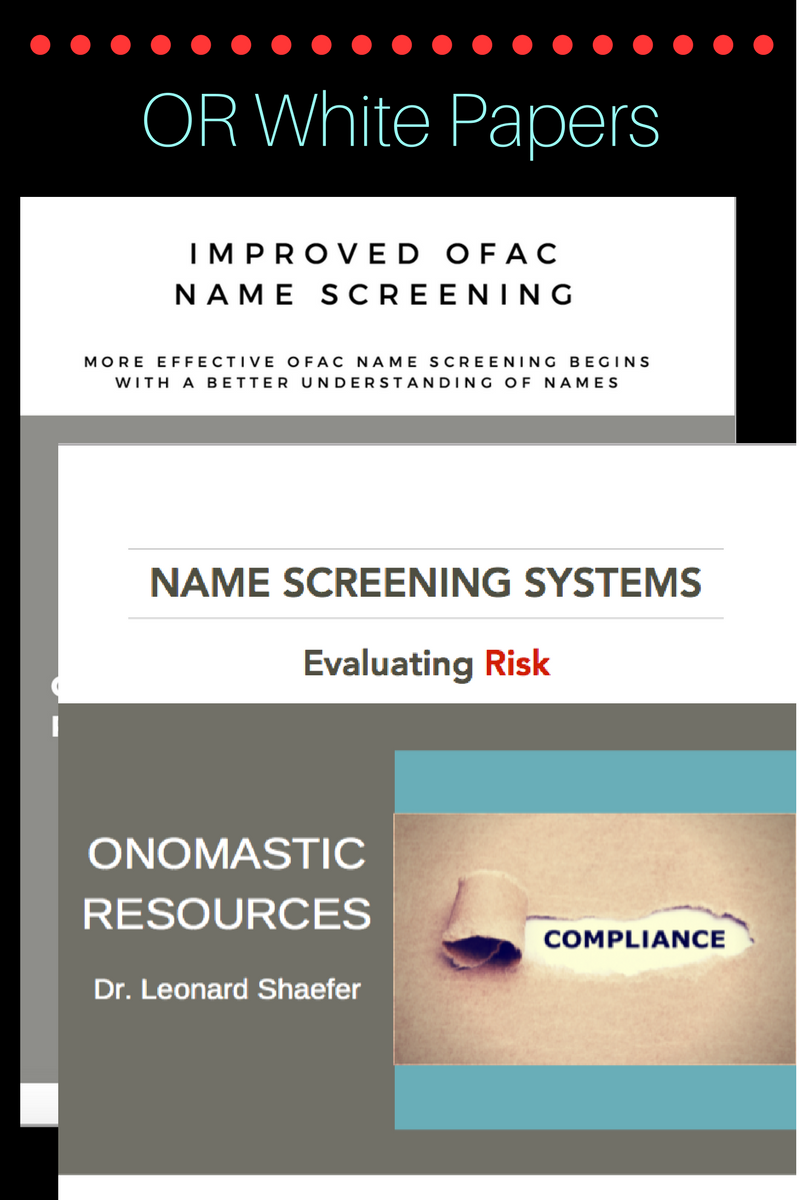Category: Name Processing Technology
The Cultural Myopia in OFAC Search Tool & Lists Puts Banks at Risk

What makes a name “Anglo”? In my last post, I suggested that much of the confusion surrounding what might count as “minimally compliant” and/or “due diligence” by OFAC is a result of the way they describe and exemplify the recommended decision making process for name screening. IMHO,this process is culturally …
OFAC Compliance: What Counts as Due Diligence?

“We’re from the Government, and we’re here to help.” OFAC supports U.S. financial institutions in their list-screening operations in several ways. It provides: Current data on the many distinct lists of names of parties that fall under one or another of its enforcement actions, each of which is continuously updated …
Provenance Is Destiny, Or “Where Did You Get That Name?”
Effective Asset Allocation for Improved Name-Processing

In every organization that maintains one or more name-centric processes (NCPs), certain organizational resources (human and technical) are allocated to conduct and/or manage those processes. Improving the outcomes from processes such as name-screening, name-capture, match-merge/customer data integration in many instances can often require little more than doing a better job …
What is the state of the art for name-processing?
What is name-centric processing?

The term name-centric processing refers to any automated or manual process in which a successful outcome is wholly or principally dependent on technologies and human judgment applied to named entities (NEs). Such processes can range in complexity from a simple membership look-up to sophisticated, real-time assessments of vital intelligence data …
Why are names important?

Data assets are among the most valuable resources that an organization possesses. Many tools and technologies have been made available in the marketplace in recent years to help organizations exploit these data assets more effectively, in order to advance organizational goals or to gain a competitive advantage. This is the …
The Cultural Myopia in OFAC Search Tool & Lists Puts Banks at Risk

What makes a name “Anglo”? In my last post, I suggested that much of the confusion surrounding what might count as “minimally compliant” and/or “due diligence” by OFAC is a result of the way they describe and exemplify the recommended decision making process for name screening. IMHO,this process is culturally …
OFAC Compliance: What Counts as Due Diligence?

“We’re from the Government, and we’re here to help.” OFAC supports U.S. financial institutions in their list-screening operations in several ways. It provides: Current data on the many distinct lists of names of parties that fall under one or another of its enforcement actions, each of which is continuously updated …
Provenance Is Destiny, Or “Where Did You Get That Name?”
Effective Asset Allocation for Improved Name-Processing

In every organization that maintains one or more name-centric processes (NCPs), certain organizational resources (human and technical) are allocated to conduct and/or manage those processes. Improving the outcomes from processes such as name-screening, name-capture, match-merge/customer data integration in many instances can often require little more than doing a better job …
What is the state of the art for name-processing?
What is name-centric processing?

The term name-centric processing refers to any automated or manual process in which a successful outcome is wholly or principally dependent on technologies and human judgment applied to named entities (NEs). Such processes can range in complexity from a simple membership look-up to sophisticated, real-time assessments of vital intelligence data …
Why are names important?

Data assets are among the most valuable resources that an organization possesses. Many tools and technologies have been made available in the marketplace in recent years to help organizations exploit these data assets more effectively, in order to advance organizational goals or to gain a competitive advantage. This is the …




![Headline from BC Russian-Language Service, May 2015 [Russian]](https://www.onomasticresources.com/wp-content/uploads/2015/05/BBC-Russian.png)

